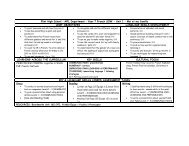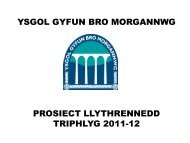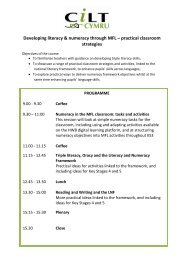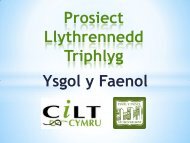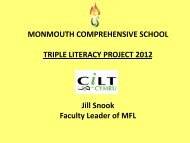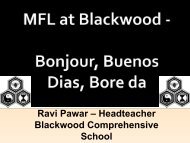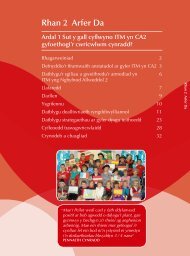Support
Part 4 Further Support - CILT Cymru
Part 4 Further Support - CILT Cymru
- No tags were found...
Create successful ePaper yourself
Turn your PDF publications into a flip-book with our unique Google optimized e-Paper software.
Part 4 Further <strong>Support</strong><br />
Introduction 1<br />
Local Education Authorities in Wales 2<br />
Pilot project schools and their LEAs 3<br />
Continuing professional development for primary 5<br />
modern foreign languages<br />
Resources for primary modern foreign languages 9<br />
* Updates and Notes<br />
“Sharing good practice and spending time<br />
with my primary colleagues has really<br />
helped me think about the way I teach the<br />
pupils when they come to me in Year 7”<br />
Secondary MFL teacher<br />
“I’ve really enjoyed the MFL sessions.<br />
They’ve enabled me to access a language that<br />
I have had no experience in previously. Most<br />
of all I’ve really enjoyed learning alongside<br />
my pupils and I can’t wait to learn more”<br />
Primary year 6 teacher<br />
Part 4 Further <strong>Support</strong>
Introduction<br />
Part 4 provides a list of useful contacts, CPD providers and resources which can<br />
provide further guidance and support to help you get started. It includes:<br />
• a list of all 22 Local Education Authorities in Wales and their contact telephone<br />
numbers;<br />
• a list and location map of all primary and secondary schools involved in the CILT<br />
Cymru MFL in Key Stage 2 Pilot Project;<br />
• a list of national organizations which provide and / or fund continuing professional<br />
development in the field of primary modern foreign languages and / or the<br />
international dimension;<br />
• ideas for primary MFL resources and where to find them.<br />
Part 4 Further help and support – Introduction<br />
1
Part 4 Further help and support – Local Education Authorities<br />
Local Education Authorities in Wales<br />
Below are contact details for all 22 LEAs in Wales † . Within each LEA there should be a<br />
link person who will be able to advise you about the Better Schools Fund. There will<br />
usually be a link person with a remit for MFL, a senior primary and secondary adviser<br />
and a WIDE Network (Wales International Dimension in Education) representative.<br />
LEA<br />
TELEPHONE<br />
Anglesey ** 01248 752903<br />
Blaenau Gwent 01495 355822<br />
Bridgend * 01656 643643<br />
Caerphilly * 01443 864955<br />
Cardiff 029 2087 2000<br />
Carmarthenshire 01994 231866<br />
Ceredigion 01970 633656<br />
Conwy 01492 575001<br />
Denbighshire 01824 712777<br />
Flintshire 01352 704086/087<br />
Gwynedd ** 01286 679467<br />
Merthyr Tydfil * 01685 724600<br />
Monmouthshire 01633 644498<br />
Neath Port Talbot 01639 763722<br />
Newport 01633 233473<br />
Pembrokeshire 01437 775020<br />
Powys 01597 826422<br />
Rhondda Cynon Taff * 01443 744009<br />
Swansea 01792 562660<br />
Torfaen 01633 647639<br />
Vale of Glamorgan 01446 709447<br />
Wrexham 01978 310000<br />
* ESIS The Education and Schools Improvement Services 01443 827500<br />
** CYNNAL The Advisory Service for Gwynedd and Anglesey 01286 677686<br />
†<br />
Information correct at time of going to press (Nov 2008)<br />
2
Pilot project schools and their LEAs<br />
The National Pilot Project introducing a MFL in Key Stage 2 has involved 118 primary<br />
schools and their 18 associate secondary schools. This work involved 18 LEAs and ran<br />
from 2003-2009.<br />
The following map shows a list of all project schools and LEAs which have developed<br />
expertise during the course of the Pilot. As you begin to plan developing primary<br />
MFL in your LEA or cluster of schools, they could provide invaluable information<br />
and share their experiences with you. There may also be other clusters of schools in<br />
your authority which are already involved in primary MFL and with which you could<br />
collaborate and share good practice.<br />
18<br />
17<br />
19 20<br />
21<br />
Part 4 Further help and support – Pilot project schools and their LEAs<br />
See page 4 for full<br />
list of participating<br />
schools.<br />
16<br />
15<br />
14<br />
13<br />
12<br />
8<br />
11<br />
7<br />
9<br />
10<br />
4<br />
3<br />
5 6<br />
1<br />
2<br />
3
Part 4 Further help and support – Pilot project schools and their LEAs<br />
1 YSGOL GYFUN GWYNLLYW<br />
Ysgol Bryn Onnen<br />
Ysgol Gymraeg Brynmawr<br />
Ysgol Gymraeg Casnewydd<br />
Ysgol Gymraeg Y Fenni<br />
Ysgol Y Ffin<br />
Ysgol Gymraeg Cwmbran<br />
Torfaen, Newport, Blaenau Gwent,<br />
Monmouth<br />
2 FAIRWATER HIGH SCHOOL<br />
Greenmeadow Primary<br />
Blenheim Road Community School<br />
Coed Eva Junior School<br />
Henllys CIW School<br />
Torfaen<br />
3 YSGOL GYFUN CWM RHYMNI<br />
Ysgol Y Lawnt<br />
Ysgol Gymraeg Bro Allta<br />
Ysgol Gymraeg Cwm Gwyddon<br />
Ysgol Gymraeg Trelyn<br />
Ysgol Gynradd Gymraeg Caerffili<br />
Ysgol Ifor Bach Senghenydd<br />
Ysgol Gynradd Gymraeg Y Castell<br />
Ysgol Gymraeg Gilfach Fargoed<br />
Ysgol Bro Sannan<br />
Caerphilly<br />
4 INNOVATIVE PRIMARY SCHOOL<br />
Tir-y-berth Primary<br />
Caerphilly<br />
5 YSGOL GYFUN GYMRAEG<br />
GLANTAF<br />
Ysgol Gymraeg Melin Gruffydd<br />
Ysgol Mynydd Bychan<br />
Ysgol Bro Eirwg<br />
Ysgol-Y-Wern<br />
Ysgol Berllan Deg<br />
Cardiff<br />
6 WHITCHURCH HIGH SCHOOL<br />
Coryton Primary<br />
Eglwys Newydd Primary<br />
Eglwys Wen Primary<br />
Llanishen Fach Primary<br />
Rhiwbina Primary<br />
Birchgrove Primary<br />
Meadowbank Special School<br />
Gabalfa Primary School<br />
Hawthorn Junior School<br />
Cardiff<br />
7 CYFARTHFA HIGH SCHOOL<br />
Gwaunfarren Primary<br />
Twynyrodyn Community School<br />
Cyfarthfa Juniors<br />
Heolgerrig Primary<br />
Ysgol Coed Y Dderwen<br />
Ysgol-Y-Graig Primary School<br />
Caedraw Primary School<br />
Merthyr Tydfil<br />
8 YSGOL GYFUN CYMER<br />
RHONDDA<br />
Ysgol Gynradd Gymraeg Ynyswen<br />
Ysgol Gynradd Gymraeg Bodringallt<br />
Ysgol Gynradd Gymraeg Llwyncelyn<br />
Ysgol Gynradd Gymraeg Bronllwyn<br />
Ysgol Gynradd Gymraeg Llyn<br />
Y Forwyn<br />
Rhondda Cynon Tâf<br />
9 BRYNCELYNNOG<br />
COMPREHENSIVE<br />
Llanilltyd Faerdref Primary<br />
Llwyncrwn Primary School<br />
Gwauncelyn Junior School<br />
Gwaunmeisgyn Junior School<br />
Maesybryn Primary School<br />
Rhondda Cynon Tâf<br />
10 COWBRIDGE<br />
COMPREHENSIVE<br />
Llancarfan County Primary School<br />
St Brides C.I.W Primary<br />
Peterston-Super-Ely C.I.W Primary<br />
St.David’s C.I.W Primary<br />
Llansannor C.I.W Primary<br />
Llangan Primary<br />
Llanfair Primary<br />
Vale of Glamorgan<br />
11 Primaries continuing<br />
independently<br />
Vale of Glamorgan<br />
12 PENCOED COMPREHENSIVE<br />
Coychurch (Llangrallo) Primary<br />
Pencoed Junior School<br />
Croesty Primary School<br />
Coety Primary School<br />
Heolycyw Primary School<br />
Llanharan Primary School<br />
Brynnau Primary School<br />
Dolau County Primary School<br />
Bridgend<br />
13 YSGOL GYFUN YSTALYFERA<br />
Ysgol Tyle’r Ynn<br />
Ysgol Gynradd Gymraeg Pontardawe<br />
Ysgol Gynradd Gymraeg<br />
Cwm Nedd<br />
Ysgol Gynradd Gymraeg Castell<br />
Nedd<br />
Ysgol Gynradd Gymraeg Rhos Afan<br />
Ysgol Gynradd Gymraeg Blaendulais<br />
Neath Port Talbot<br />
14 YSGOL GYFUN GWYR<br />
Ysgol Gynradd Gymraeg Login Fach<br />
Ysgol Gynradd Gymraeg Pontybrenin<br />
Ysgol Gynradd Gymraeg Bryniago<br />
Ysgol Gynradd Gymraeg Llwynderw<br />
Ysgol Gynradd Gymraeg Brynymor<br />
Swansea<br />
15 YSGOL GLAN Y MÔR<br />
Pembrey C.P School<br />
Burryport Junior School<br />
Pwll C.P Mixed School<br />
Ysgol Y Castell<br />
Carmarthenshire<br />
16 YSGOL UWCHRADD<br />
TREGARON<br />
Ysgol Gynradd Penuwch<br />
Ysgol Gynradd Llangeitho<br />
Ysgol Gynradd Pontrhydfendigaid<br />
Ysgol Gynradd Tregaron<br />
Bronant Community School<br />
Ysgol Gynradd Llanddewi Brefi<br />
Ysgol Gynradd Lledrod<br />
Ceredigion<br />
17 YSGOL Y MOELWYN<br />
Ysgol Maenofferen<br />
Ysgol Y Manod<br />
Ysgol Gynradd Tanygrisiau<br />
Ysgol Bro Hedd Wyn<br />
Ysgol Bro Cynfal<br />
Ysgol Edmwnd Prys<br />
Gwynedd<br />
18 YSGOL SYR THOMAS JONES<br />
Ysgol Gymuned Llanfechell<br />
Ysgol Gymuned Rhosybol<br />
Ysgol Goronwy Owen<br />
Ysgol Gynradd Penysarn<br />
Ysgol Gymuned Moelfre<br />
Ysgol Gynradd Amlwch<br />
Ysgol Gynradd Cemaes<br />
Ysgol Carreglefn<br />
Anglesey<br />
19 YSGOL JOHN BRIGHT<br />
Ysgol Bodafon<br />
Ysgol Tudno<br />
Ysgol San Siôr<br />
Ysgol Glanwydden<br />
Ysgol Ffordd Dyffryn<br />
Ysgol Deganwy<br />
Ysgol Blessed William Davies<br />
Ysgol Craig y Don<br />
Ysgol Morfa Rhianedd<br />
Conwy<br />
20 YSGOL BRYN ELIAN<br />
Ysgol Gynradd Cynfran<br />
Ysgol Hen Golwyn<br />
Ysgol y Plas<br />
Ysgol Tan y Marian<br />
Ysgol Llanddulas<br />
Conwy<br />
21 INNOVATIVE PRIMARY<br />
SCHOOL<br />
Ysgol Frongoch<br />
Denbighshire<br />
4
Continuing professional development<br />
for primary modern foreign languages<br />
Below is a list of organizations that can offer advice and continuing professional<br />
development and / or funding in the field of primary modern foreign languages and /<br />
or the international dimension.<br />
CILT Cymru –<br />
The National Centre for Languages in Wales<br />
CILT Cymru provides a comprehensive programme of support and<br />
continuing professional development for anyone involved in the teaching and learning of<br />
modern foreign languages in Wales. The main office is located in Cardiff Bay.<br />
<strong>Support</strong> for MFL in the primary sector includes:<br />
• CPD on good practice in getting started and developing primary MFL and in early<br />
language learning methodology;<br />
• advisory support for primary and secondary MFL teachers (including non-specialist<br />
MFL teachers);<br />
• advisory support for LEAs, headteachers and transition coordinators with an interest<br />
in developing primary MFL;<br />
• primary-focussed web pages on CILT Cymru website containing details of training<br />
events, good practice, latest developments in primary MFL, links to resources and<br />
useful contacts;<br />
• a section of the CILT Cymru newsletter devoted to primary MFL;<br />
• a drop-in resource centre housing a constantly updated bank of materials in<br />
all media.<br />
Contact<br />
1st Floor<br />
Cambrian Buildings<br />
Mount Stuart Square<br />
Cardiff CF10 5FL<br />
Tel: 029 20 48 0137<br />
Fax: 029 2048 0145<br />
Website<br />
www.ciltcymru.org.uk<br />
* A pdf copy of this guidance<br />
can be downloaded from<br />
the website.<br />
Part 4 Further help and support – Continuing professional development for primary modern foreign languages<br />
CILT Cymru Primary Team<br />
Carolyn Goodwin<br />
Primary Language Teaching Adviser<br />
carolyn.goodwin@ciltcymru.org.uk<br />
Nia Gwyn Jones<br />
Primary Language Teaching Adviser<br />
nia.jones@ciltcymru.org.uk<br />
Primary MFL<br />
ITM Cynradd<br />
www.ciltcymru.org.uk<br />
www.ciltcymru.org.uk/<br />
english/primary/Homepage/<br />
primaryhome.htm<br />
5
Part 4 Further help and support – Continuing professional development for primary modern foreign languages<br />
CILT – The National Centre for Languages<br />
CILT, the National Centre for Languages works directly<br />
with practising teachers to produce a comprehensive<br />
programme of conferences and training events for classroom teachers across all sectors<br />
of language teaching in England.<br />
CILT also organizes 1 and 2 week intensive language courses for teachers. These are<br />
residential courses which are held in the foreign country and are available in French,<br />
German, Spanish and Italian.<br />
NACELL – National Advisory Centre on Early<br />
Language Learning<br />
The National Advisory Centre on Early Language Learning (NACELL) is coordinated<br />
by CILT, the National Centre for Languages on behalf of the DCSF (Department for<br />
Children, Schools and Families). NACELL provides support for teachers and institutions<br />
involved in the provision of early MFL learning.<br />
The Primary Languages Training Zone<br />
The Primary Languages website is an online toolkit to develop<br />
primary languages teaching and learning. It offers users comprehensive access to<br />
professional development to support themselves, colleagues and peers in implementing<br />
the statutory requirement for MFL in England from 2011. Providing regularly updated<br />
examples of classroom interaction and ‘talking head’ interviews, it supports a common<br />
understanding of primary languages pedagogy.<br />
Contact<br />
CILT<br />
3rd Floor,<br />
111 Westminster Bridge Road,<br />
London SE1 7HR<br />
Tel: 020 7379 5101<br />
Fax: 020 7379 5082<br />
NACELL<br />
nacell@cilt.org.uk<br />
Primary Languages Training Zone<br />
support@primarylanguages.org.uk<br />
Website<br />
www.ciltcymru.org.uk<br />
www.nacell.org.uk<br />
www.primarylanguages.org.uk<br />
CILT language courses abroad<br />
conferences@cilt.org.uk<br />
www.cilt.org.uk/cpd/abroad/<br />
index.htm<br />
6
The British Council Wales<br />
The British Council is the UK’s international agency for<br />
educational exchange, and runs a range of projects bringing<br />
together schools In the UK with schools around the world, to the benefit of both.<br />
Funded projects include opportunities for staff to participate in in-service training<br />
activities in another country, including the 2 week primary teachers’ project and<br />
opportunities for schools to access a foreign language assistant.<br />
Contact<br />
British Council Wales<br />
28 Park Place<br />
Cardiff CF10 3QE<br />
Tel: 029 2039 7346<br />
Fax: 029 2023 7494<br />
wales.enquiries@britishcouncil.org<br />
Comenius in-service training grants<br />
Website<br />
www.britishcouncil.org/<br />
wales.htm<br />
www.britishcouncil.org/<br />
comenius.htm<br />
2 week primary teachers’ project (from Feb 2009)<br />
This is a new opportunity for primary teachers in Wales to obtain British Council<br />
funding to attend 1 week of intensive language training + 1 week job shadowing in a<br />
country where the target language is spoken. Funding covers training and contributes to<br />
supply cover for the release of teachers.<br />
For more information about the 2 week primary teachers’ project, contact the British<br />
Council Wales or the CILT Cymru primary team.<br />
Wales International Dimension in Education<br />
This network of advisory support facilitates the development of the<br />
International Dimension through projects and links in Europe and<br />
globally for schools throughout Wales. The WIDE (Wales International<br />
Dimension in Education) Network organizes CPD to support schools just starting out,<br />
showcasing examples of good practice and encouraging more experienced schools<br />
to gain recognition through the International Schools Award and now also the British<br />
Council / WIDE awards.<br />
Contact<br />
Wales International Dimension in Education<br />
Current co-ordinator: Alison Jenner<br />
City and Council of Swansea Lifelong<br />
Learning Service<br />
Dynevor Centre, Dynevor Place,<br />
Swansea SA1 3ET<br />
Tel: 01792 648081<br />
Fax: 01792 653722<br />
Alison.Jenner@swansea.gov.uk<br />
Website<br />
www.rhwyd.net<br />
Part 4 Further help and support – Continuing professional development for primary modern foreign languages<br />
7
Part 4 Further help and support – Continuing professional development for primary modern foreign languages<br />
Contact<br />
Professional Development Team<br />
GTCW<br />
4th Floor, Southgate House,<br />
Wood Street,<br />
Cardiff, CF10 1EW<br />
Tel: 029 2055 0350<br />
CPD Fax: 029 2055 0655<br />
or GTCW Fax: 029 2055 0360<br />
cpd@gtcw.org.uk<br />
GTCW – General Teaching Council for Wales<br />
The GTCW administers a Professional Development<br />
Programme on behalf of the Welsh Assembly Government<br />
and provides teachers with funding to meet their own<br />
professional development needs.<br />
Website<br />
www.gtcw.org.uk<br />
8
Resources for primary modern<br />
foreign languages<br />
There are many resources available to assist the teaching and learning of modern<br />
foreign languages in the primary phase. There are some very good published resources<br />
to buy and some equally useful and effective, free resources. This section outlines the<br />
kinds of resources that can be used and offers ideas as to where to find them.<br />
During the course of the Pilot, project schools built up a stock of resources for MFL<br />
teaching and learning in Key Stage 2. Partnerships between primary and secondary<br />
teachers facilitated cost effective use of resources, since schools were able to use<br />
materials already available within the secondary MFL department as well as in the<br />
primary classrooms. Schools were also able to share resources amongst the cluster<br />
where appropriate.<br />
When building up a stock of resources for MFL at Key Stage 2 as a cluster, being<br />
creative and resourceful with existing materials is therefore often a good place to start.<br />
Existing resources within the primary school<br />
You may find that primary classrooms already contain teaching materials which can<br />
be used for MFL (e.g. multi link coloured cubes and number fans can be used to teach<br />
numbers and colours, mini symmetry mirrors can be used to practice pronunciation,<br />
toys, puppets and games can be used to encourage communication and creativity using<br />
the language).<br />
The kinds of resources commonly used by pilot schools included:<br />
games toys digital / video cameras<br />
songs puppets webcams<br />
rhymes dressing up clothes internet<br />
poems maps + charts interactive whiteboard<br />
traditional stories multi link cubes correspondence from<br />
e-pals / pen pals<br />
mini bean bags counters older pupils<br />
flashcards dice visiting speakers of the MFL<br />
mini whiteboards symmetry mirrors parents who speak the MFL<br />
Part 4 Further help and support – Resources for primary modern foreign languages<br />
9
Part 4 Further help and support – Resources for primary modern foreign languages<br />
Sharing resources within the cluster<br />
Secondary MFL departments working in collaboration with their associate primary<br />
schools can share materials being used in Key Stage 3. These include software<br />
packages for MFL and online or downloadable resources shared through virtual<br />
learning environments (VLEs). If you are considering purchasing ICT software for MFL,<br />
publishers are often happy to provide free demonstrations and will be happy discuss<br />
how best to meet the needs of the cluster as regards fees for site licenses.<br />
CILT Cymru resources<br />
CILT Cymru holds a comprehensive library of early language learning materials for a<br />
range of languages, including books, CDs, videos, DVDs, games, software and publishers’<br />
catalogues. You can visit during office hours (9am – 5pm) and also make use of the<br />
multimedia facilities available. The library includes a section on research into early<br />
language learning and current methodology for reference purposes (schemes of work,<br />
teacher’s guides and good practice materials such as the CILT Young Pathfinders series).<br />
The KS2 section of the CILT Cymru website also has links to useful resources, including<br />
an archive of websites of the month for primary MFL.<br />
Other useful contacts for information about primary MFL and teaching resources for<br />
young learners include:<br />
NACELL www.nacell.org.uk/index.htm<br />
NGfL Cymru www.ngfl-cymru.org.uk<br />
The Primary Languages Training Zone www.primarylanguages.org.uk<br />
10
Published resources<br />
If you are considering supplementing your existing bank of materials with published<br />
resources, think about how they would complement the needs of the cluster, including<br />
the expertise of the staff delivering the lessons, the age of the children being taught and<br />
the MFL being introduced.<br />
The kinds of resources commonly used<br />
by pilot schools included:<br />
• audio CDs + accompanying lyrics<br />
and music scores<br />
• DVDs for MFL<br />
• MFL software for use on an<br />
interactive whiteboard<br />
• CD-Roms<br />
• games<br />
• reading books (big books / stories /<br />
factual)<br />
• dictionaries<br />
• posters<br />
• reward stickers / stampers / certificates<br />
• realia and props<br />
Part 4 Further help and support – Resources for primary modern foreign languages<br />
11
Updates and Notes<br />
This section has been created for you<br />
to store your own notes and records.



